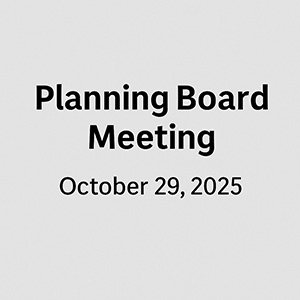The Planning Board met on Oct. 29 to review the Carroll School site plan at 37-39-45 Waltham Road, and two Wayland bylaws were cited as applying — §198-601 (Dover-exempt site plan review) and §198-508 (Design Review). The Planning Board’s review under the bylaws is limited to bulk, height, setbacks, open space, and parking requirements for nonprofit educational uses.
Keri DeLeo of Scalora Consulting Group, the owner’s project manager, summarized the proposal to consolidate three parcels into one parcel and build three new buildings on the campus. DeLeo said applications have been filed with the Planning Board, Conservation Commission, and Board of Health, and coordination continues with the Lincoln Select Board and both towns’ police and fire departments.
Key community concerns include traffic volume and speed, parking lot lighting, landscaping buffers, and communication with abutters. She confirmed lighting would remain “dark-sky compliant.” landscaping would use low-height evergreens for screening, and a new contact address had been established for residents to report problems such as early arrivals or contractor issues: carrollneighbors@carrollschool.org.
Jason Kreil, the town’s peer reviewer from Environmental Consulting & Technology (ECT), reported that the project complies with height and use requirements but needs clarification on stormwater management, lighting photometrics, and internal circulation. He cited questions on infiltration system standards, ADA ramp inclusion, and vehicle turning radii for buses and fire trucks. A traffic study found traffic speeds exceeded the 30 mph limit in the 85th percentile, prompting safety recommendations.
Attorney Dan Hill, representing abutters in Wayland and Lincoln, emphasized that neighbors are not opposing the educational use but questioned the project’s size, long-term campus plans, and cumulative trip generation. He noted that total daily trips could exceed 1,000, potentially triggering a state MEPA filing. He also requested a construction management plan and clearer notice procedures for Lincoln residents.
Hydrologist Scott Horsley and civil engineer John Chessia, engaged by abutters, testified that the 2025 stormwater model appears inconsistent with 2016 approved plans, omitting infiltration system locations and test pits required by the MassDEP Stormwater Handbook. Both warned that shallow groundwater at the site could increase groundwater mounding and require further analysis.
Supporters Zach Tofias and Marguerite McConihe praised the school’s educational mission and community value. Neighborhood residents on Long Meadow Road, Lincoln Road and Appletree Lane raised concerns about increased traffic, safety on Waltham Road, potential flooding from nearby Hazel Brook and wetlands, and limited neighborhood outreach.
Carroll Head of School Renee Greenfield acknowledged neighbors’ anxiety and said responses to all questions will be consolidated for the next hearing. She reiterated that Carroll School families are reminded not to use Long Meadow Road as a cut-through to Lincoln Road/Route 117 and invited residents to report violations through the new email channel.
The Board directed the applicant to supplement its traffic study to include non-peak school departure times, additional intersections in Lincoln, and coordination with the towns’ planned seven-day traffic data collection. Chair Lewis requested submission of a construction management plan, project phasing schedule, and updated stormwater documentation before the continued hearing on Nov. 19 at the Council on Aging/Community Center at 8 Andrew Ave.
In other business, the Board debated recommending funding caps for Community Preservation Committee (CPC) grants to private entities. Lewis suggested limiting awards to $25,000–$35,000 and prioritizing municipal projects over private entities. Members discussed past CPC grants to the Vokes Theatre, the Historical Society, and Wayland Community Pool. No vote was taken, but member Larry Kiernan will seek CPC feedback on possible policy changes.
Communities raise funds for Community Preservation Act (CPA) through a local property tax surcharge of up to 3% and receive a matching grant from a statewide Community Preservation Trust Fund. Over the past five years, there has been a decrease in the state portion of the Community Preservation Trust Fund (CPF) payment in Massachusetts, due to declining Revenue from a decrease in the volume of real estate transactions and dilution of the state match. There are 196 plus communities participating in CPA, decreasing a 100% match in the early years of the program to approximately an 18% base match in 2024.
Hummel reported that the Terrain retail and restaurant project at the former Whole Foods site has closed under Grossman Development Group, and the Mahoney’s Garden Center matter remains under appeal with the Department of Environmental Protection. He also outlined plans to request $40,000 in CPC funds for the Regional Housing Service Office and future updates to the town’s housing production plan.
Members finalized plans for the Nov. 12 ADU public forum, to be held at 7 p.m. at the Town Building Council on Aging room. Member Robin Borgestedt described edits to building department handouts to make permit steps clearer for residents, including definitions of required permits and agency contacts. Panelists and materials were confirmed.
The Board approved minor amendments to the 2023 Phase One site plan decision for the Council on Aging/Community Center. The revisions extend the deadline for as-built plan submission and require filing at the Registry of Deeds.
















